- Home
- McBain, Ed
Killer's Payoff Page 15
Killer's Payoff Read online
Page 15
ARTHUR BROWN was tired of the virgins of Bali in full color. He was tired of the four wooden walls of the mock telephone-company shack. He was tired of the headset with which he monitored the tape. He was tired of the inane social drivel that passed back and forth between Lucy Mencken and her contacts in the world at large.
Arthur Brown was a most impatient man. He’d had the bad misfortune to be born with a name that emphasized his color. With Arthur Brown, the hatemongers had really had a field day. Because he was fair-minded and because he thought it might be better to give the haters an edge by giving himself a handicap, he had often thought of changing his name to Goldstein, thereby adding religion to color and offering the haters an opportunity to really flip their wigs. His impatience was born of expectation. Arthur Brown could look at a man and know instantly whether or not his color would be a barrier between them. And knowing, he would then expect the inevitable slur; and expecting it, he would then impatiently wait for it. He was a man sitting on a powder keg, the fuse of which had been lighted by the chance pigmentation of his skin.
The tap on Lucy Mencken’s phone had none of the characteristics of a powder keg, but it nonetheless filled Brown with itchy impatience. He could, by now, have told anyone interested exactly what the Mencken family would be having for dinner every night of next week, exactly what sniffles or sneezes the Mencken children had suffered during the past few days, the forthcoming social plans of the entire family, and even the bra size—a spectacular size, he admitted—of Lucy Mencken.
Arthur Brown was bored.
Arthur Brown was impatient.
He thought of his brothers of toil back at the 87th. Those lucky ones would be dealing with rapes and muggings and knifings and burglaries and robberies and homicides and all sorts of interesting lively criminal activities. He had to sit in a shack and listen to the proprietress of the women’s wear shop in Peabody—he knew her well by now; her name was Antoinette, and the shop was sickeningly called the Curve Corner—tell Lucy Mencken about the new line of bathing suits that had arrived, and wouldn’t she like to come down and try some on?
Brown devoutly wished she would go down and try some on. He wished she would take her son and daughter with her and allow them to try on some bathing suits, too. He hoped that Charles Mencken needed new swim trunks. He hoped the entire family would go down to the Curve Corner and enjoy an orgy of trying on svelte swimwear. Then the phone would be free for the afternoon. Then he would not have to listen to female gossip about a girl named Patricia Harper who danced too intimately with the husbands of Peabody; then he would not have to listen to plans for the next garden-club meeting (the club was called the Peabody Potters); then he would not have to listen to eight-year-old Greta’s telephone romance with a ten-year-old boy named Freckles.
In short, he would not have to invade the goddamn privacy of what seemed to be a normal, decent, clean-living family.
He knew, of course, that the telephone company itself maintained monitoring stations. The purpose of these stations was to keep a constant check on the efficiency of the almost entirely automatic equipment. There was no intention of maintaining a telephone tap in the strictest sense of the words. But there were loud-speakers, and men listened to those loud-speakers, and if anyone thought a telephone call was a private thing, he was sadly mistaken. Usually, the speaker was tuned down to a low mumble. Occasionally, and completely arbitrarily, it was turned up so that words became intelligible. A telephone call was about as private as a church auction, and this should have lessened the guilt Brown was feeling. Too, he was waiting for a call that might lead them to a criminal. But neither of these factors lessened the unpleasantness of his job, nor the impatience with which he attacked it.
When the call came, he girded himself for what he was certain would be another social exchange. The light flashed on the recording equipment as soon as the receiver was lifted from the cradle in the Mencken home. Brown put on his earphones. Before him, the tapes wound relentlessly. The bug in the base of the Mencken phone picked up every word.
“—wait a moment, I’ll see if she’s home.”
That was the Mencken maid. Brown knew her voice by heart. There was a long pause. Then…
“Hello?”
“Mrs. Mencken?”
Brown heard what could have been a short gasp from Mrs. Mencken.
“Yes?”
“You’ve had time to think over my last call, ain’t you?”
“Who is this?” Lucy asked.
“Never mind who this is. I told you this is a friend of Sy Kramer’s. I know all about the arrangement he had with you, and I’ve already told you there will be a few changes now that he is dead. Is that clear?”
“Yes, but…”
“You wouldn’t want that material released to the newspapers, would you?”
“What material?”
“Don’t bluff me, Mrs. Mencken. You know what material I’m talking about, so don’t try to bluff me.”
“All right,” she said.
“I want you to meet me tonight.”
“Why? Just give me your name, and I’ll send you the check.”
“You’ll send a policeman to pick me up, you mean.”
“No, I wouldn’t do that.”
“You’d be smart not to try anything like that. The material is with a friend of mine. If you try to call the police, if there’s even the smell of a cop with you when we meet tonight, that stuff gets mailed to the newspapers.”
“I understand. But why must we meet?”
“To get things set up.”
“You said it would be about the same as with Kramer.”
“I want to talk it over with you. I want to know just where we stand. I don’t want any mistakes.”
“All right,” Lucy said wearily. “Where shall I meet you?”
“Can you get in to the city?”
“Yes.”
“Do you know downtown Isola?”
“Yes.”
Brown picked up his pencil and moved his pad into writing position.
“There’s a place on Fieldover Street. Do you know where that is?”
“In the Quarter?”
“Yes. The place is called Gumpy’s. It’s right on Fieldover, near Marsten Square. I’ll meet you there.”
“What time?”
“Eight o’clock?”
“Yes,” Lucy said. “How will I know you?”
“I’ll be wearing a brown sharkskin suit.” The man paused. “I’ll be reading the Times. Remember, no cops. If there are any cops, the material gets mailed out before you can say Jack Robinson.”
“I’ll be there,” Lucy promised.
“Bring your checkbook,” the man said, and he hung up. The next call Lucy Mencken made was to her husband’s office. She told Charles Mencken that a college roommate of hers, a girl named Sylvia Cooke, was in town and wanted Lucy to join her for the evening. Would it be all right?
Charles Mencken was a trusting husband with a faithful wife. He told Lucy it would be perfectly all right. In fact, he would take the children to the country club for dinner. She told him she loved him, and then broke the connection.
Arthur Brown immediately called the 87th Squad.
GUMPY’S COULD JUST AS EASILY have been called Dumpy’s, because it was just that. Whoever had made the call to Lucy Mencken had shown considerable unconcern for the fact that she was a lady. The person who’d called her had even shown unconcern for the fact that she was a woman.
Gumpy’s was on Fieldover Street, close to Marsten Square. Gumpy’s catered to the trade in the Quarter. The trade did not care very much about the furniture in Gumpy’s, or the lighting, or the fact that the walls seemed ready to cave in. The trade was neither here nor there, and the trade was more or less protected by a state law that made a token show of force while actually overlooking the neither here nor there status of such people as composed the clientele of Gumpy’s. Many people from other places in the city came to ogle the steady
clientele of Gumpy’s. It was good clean fun to howl at two men dancing together. It was excruciatingly comic to see a woman wearing a man’s suit and paying court to another woman. These sightseers, like the steady clientele, were too interested in what was happening around them to pay too much attention to the décor of the place. Even the fire inspector didn’t care very much. It was rumored about that Gumpy himself paid a considerable chunk each month to keep the place from being condemned as a fire trap. Such rumors always run rife when a man has a profitable enterprise going for him. Why, the fire inspector may have been the most honest man in the city, and far above taking any sort of bribe.
The detective who went to Gumpy’s in a sports shirt and slacks on the night of July thirteenth was a man who had no connection with the Kramer case at all. In debating who should make the collar, Carella and Hawes weighed in the fact that Hawes had been tailed not two nights before. It was possible, just possible, that the tail would turn out to be the person who had the assignation with Lucy Mencken. And if Hawes had been tailed, was it not likely that other members of the squad had likewise been tailed and could likewise be recognized? They did not want to lose a collar by being spotted for bulls. They chose a man who’d done no legwork on the Kramer case, a man in fact who’d just polished off a burglary and who was waiting for action.
The man’s name was Bob O’Brien. He was a Detective 2nd/Grade. He was Irish clear down to his belly button. Some of the bulls held that the only reason he’d joined the force was so that he’d be able to march in the St. Paddy’s Day parade down Hall Avenue. Actually, O’Brien had joined the force quite by accident. He’d applied for positions as postal clerk, fireman, and cop; he’d passed all three examinations. By pure chance, the police department had called him first, and he’d taken the job.
O’Brien was six feet one inch tall and he weighed two hundred and ten pounds. When you got hit by O’Brien, you sometimes suffered a fractured jaw. The hamhock-hands cliché had been invented to apply to the Irish mitts of Bob O’Brien. He’d been raised in Hades Hole, and had learned the art of street fighting (as opposed to the art of boxing) before he’d cut his second teeth. In those days, O’Brien had been on the opposite side of the law. When you saw a cop coming, you ran like hell. Now, and fortunately for the city, he was on the right side of the fence, using his fists for law enforcement, using his 20/20 vision and his .38 Police Special to excellent advantage.
Bob O’Brien had killed seven men in the line of duty.
He was not a trigger-happy cop. He never used his gun unless he had to. But there are cops who get the dirty end of the stick, cops who are forced to use their gun, and Bob O’Brien was one of those cops. He had killed his first man when he was still a rookie, and the first man he’d killed was a man he’d known. He had still been living in Hades Hole at the time. It was a Saturday morning in mid-August, and O’Brien was off-duty and wearing a pair of swimming trunks under his slacks and sports shirt. He was supposed to meet a few of the fellows on his front stoop. From there the boys would go to the beach. He was, of course, carrying a gun in his right hip pocket. The street was quiet with the hush of a hot summer. O’Brien loafed on the front stoop, waiting for the boys. It was then that Eddie the Butcher came out of his shop with the meat cleaver.
Eddie was chasing a woman. On his face was the crazed look of a man who has lost all touch with his surroundings. O’Brien came off the stoop as the woman rushed by. He stepped directly into Eddie’s path. He had no intention of shooting Eddie.
“What’s the matter, Eddie?” he said gently.
Eddie raised the meat cleaver over his head. “Get out of my way!” he shouted.
“This is Bobby,” O’Brien said. “Now put away that—”
Eddie lunged forward, knocking O’Brien flat to the pavement. With one hand holding O’Brien’s throat, he raised his other hand over his head, and the cutting edge of the meat cleaver gleamed in the morning sunlight. O’Brien twisted onto one hip. The crazed expression was still on Eddie’s face. The meat cleaver was poised above O’Brien’s head. And then it began its shimmering descent. O’Brien, acting reflexively, drew his revolver, and fired. The cleaver dropped from Eddie’s hand, six inches from O’Brien’s face. Eddie rolled over onto the scorching pavement—dead.
That night Bob O’Brien cried like a baby.
And since that time death had hung around his neck like an albatross. Since that time he had been forced to kill six more men in the line of duty. He did not know any of these men, but that was the only difference between them and Eddie the Butcher. Whenever he was forced to kill, Bob O’Brien still wept. Not openly. He wept inside, and that is where it hurts most.
Gumpy’s was jumping that Saturday night. In the space of twenty minutes, O’Brien was approached and propositioned five times. He turned down each proposition. He felt only pity for Gumpy’s clientele, and so he turned down each proposition with a simple shake of his head. The people he despised were those who came to watch the display.
At eight ten, Lucy Mencken arrived.
She seemed quite flustered, quite beyond her depth. She sat at a table in the corner and instantly surveyed the room. The man in the brown sharkskin suit had not yet arrived. She ordered a drink and waited. O’Brien ordered a drink, which he did not touch, and he, too, waited.
At eight twenty-five the man in the brown sharkskin suit entered the bar. A copy of the Times was rolled under his right arm. He looked around, his eyes passing over Lucy Mencken and then the rest of the room. Then he went to sit at her table. A few words passed between Lucy and the man.
O’Brien got off the bar stool. Casually he walked to the table. Casually he caught the man’s brown sharkskin sleeve with his right forefinger, twisting the sleeve, capturing the man’s wrist in a makeshift handcuff.
“Police,” he said flatly. “You’re coming with—”
The man started to get out of his chair. O’Brien very casually hit him. The clientele of Gumpy’s started an ungodly shriek.
“Go home, Mrs. Mencken,” O’Brien said. “We’ll take care of him.”
Lucy Mencken surveyed O’Brien with a hard, flat stare. “Thanks,” she said, “you’ve just ruined my life.”
THE MAN IN THE sharkskin suit was Mario Torr.
In the Interrogation Room of the 87th Precinct, he said, “This is false arrest. I don’t even know why I’m here.”
“We know why you’re here,” Carella said.
“Yeah? Then suppose you tell me why. I’m an honest citizen. I’m gainfully employed. I stop into a place for a brew, I see a pretty dame, I try to pick her up, and next thing I know I’m getting the rubber hose.”
“Has anybody laid a finger on you, Torr?” Hawes asked.
“Well, no, but—”
“Then shut your mouth and answer the questions!” Meyer snapped contradictorily.
“I am answering the questions. And somebody did lay a finger on me. That lousy big Irish bastard who put the collar—”
“You resisted arrest,” Carella said.
“I resisted, my ass. I just got out of the chair. He didn’t have to hit me.”
“What were you doing in Gumpy’s?” Meyer asked.
“I told you. I stopped in for a brew.”
“Do you always go to fag joints?” Carella asked.
“I didn’t know what kind of a joint it was. I passed it, so I stopped in for a brew.”
“You called Lucy Mencken this afternoon, didn’t you?”
“No.”
“We’ve got a tape of the whole telephone conversation.”
“It must have been three other guys,” Torr said.
“Where are the pictures?”
“What pictures?”
“The pictures you were using to extort money from Lucy Mencken.”
“I don’t know what you’re talking about.”
“Did you follow me the other night?” Hawes asked.
“I didn’t follow nobody any night.”
“You followed me and hit me. Why?”
“I hit you? Don’t be ridiculous.”
“Where are the pictures?”
“I don’t know anything about pictures.”
“Were you and Kramer partners?”
“We were friends.”
“Did you kill him to get him out of the set-up?”
“Kill him! Holy Jesus, don’t tie me into that rap!”
“Which rap do you want, Torr? We’ve got a lot of them.”
“I had nothing to do with the Kramer kill. So help me Jesus.”
“We can make it look pretty good, Torr.”
“You ain’t got a chance.”

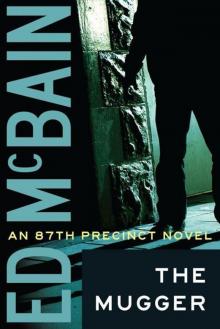 87th Precinct 02 - The Mugger
87th Precinct 02 - The Mugger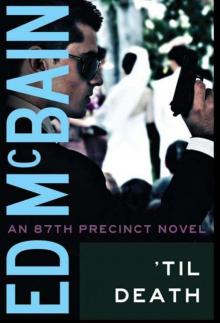 87th Precinct 09 - Til Death
87th Precinct 09 - Til Death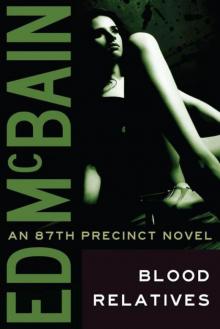 Blood Relatives (87th Precinct)
Blood Relatives (87th Precinct) Killer's Payoff
Killer's Payoff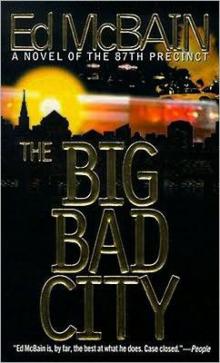 The Big Bad City
The Big Bad City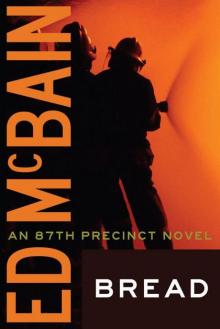 Bread (87th Precinct)
Bread (87th Precinct)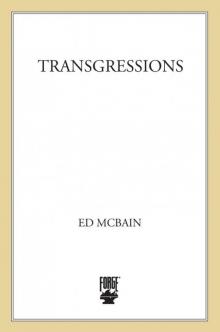 Transgressions Vol. 3
Transgressions Vol. 3 Runaway
Runaway So Long As You Both Shall Live (87th Precinct)
So Long As You Both Shall Live (87th Precinct)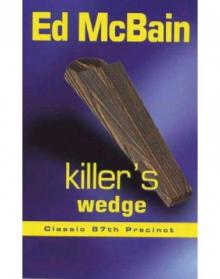 Killer's Wedge
Killer's Wedge